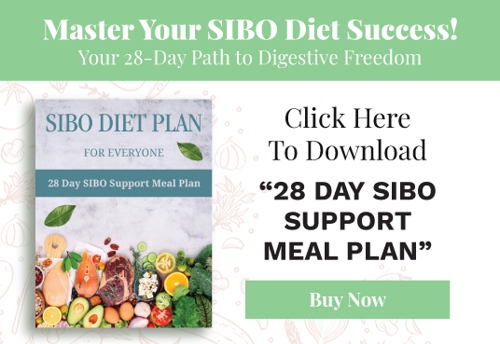Understanding the SIBODiet: A Complete Guide to Managing Small Intestinal Bacterial Overgrowth Through Nutrition
SIBO and Your Digestive Health: Understanding Small Intestinal Bacterial Overgrowth
Small intestinal bacterial overgrowth (SIBO) represents a complex digestive condition where excessive bacteria colonize the small intestine, leading to chronic digestive symptoms and nutritional challenges. Unlike the large intestine, which naturally hosts numerous gut bacteria, the small intestine should maintain relatively low bacterial levels. When this balance is disrupted, people with SIBO experience a range of uncomfortable and often debilitating symptoms.
The impact of SIBO on daily life extends far beyond occasional digestive discomfort, affecting everything from basic meal choices to social activities. While treatment with antibiotics plays a crucial role in addressing SIBO, diet remains a foundational element in managing symptoms effectively. Many patients discover that their SIBO symptoms worsen after eating certain foods, making dietary management essential for long-term relief.
Understanding how to navigate SIBO through diet can feel overwhelming, which is why we've created our comprehensive 28-Day SIBO Support Meal Plan. This structured approach takes the guesswork out of meal planning while addressing the specific nutritional needs of those managing bacterial overgrowth in the small intestine.
The Impact of SIBO: From Symptoms to Diagnosis and Treatment
SIBO symptoms often overlap with other gastrointestinal conditions, particularly IBS (irritable bowel syndrome), making proper diagnosis crucial. The range of symptoms that SIBO may cause includes persistent bloating, diarrhea, and unexplained digestive discomfort. Many people with SIBO experience chronic fatigue, nutrient deficiencies, and a noticeable decline in their quality of life.
The underlying cause of your SIBO can vary significantly, with several risk factors contributing to its development:
- Structural issues in the digestive tract
- Previous abdominal surgery
- Medications affecting gut motility
- Chronic health conditions impacting digestion
- Reduced stomach acid production
- Immune system dysfunction

Proper diagnosis typically involves:
- Comprehensive medical history review
- Physical examination
- Breath test to detect bacterial overgrowth
- Consultation with a registered dietitian
- Additional testing to rule out other conditions
Treatment for SIBO often requires a multi-faceted approach:
- Antibiotic therapy to address bacterial overgrowth
- Dietary modifications to manage symptoms
- Nutritional supplementation
- Lifestyle adjustments
- Regular monitoring and follow-up
Understanding these foundational aspects of SIBO helps explain why dietary management plays such a crucial role in both treatment and prevention. While each case presents unique challenges, following a structured approach, like our 28-Day SIBO Support Meal Plan, can provide the framework needed for successful management.
Why SiboDiet Matters: Managing SIBO Through Strategic Food Choices
The relationship between diet and SIBO management is complex and crucial. Bacteria in the small intestine thrive on certain carbohydrates and foods, making dietary choices a powerful tool in managing bacterial overgrowth. Understanding which foods to eat and avoid can significantly impact your symptoms and recovery process.
A diet for SIBO isn't simply about eliminating trigger foods – it's about creating a sustainable eating plan that:
- Reduces fermentable foods that feed harmful bacteria
- Supports healthy gut function
- Maintains proper nutrition despite dietary restrictions
- Prevents SIBO recurrence through strategic food choices
- Addresses underlying digestive issues
Many symptoms can be managed through careful attention to:
- Meal timing and spacing
- Food combinations
- Portion control
- Carbohydrate intake
- Overall diet diversity
Working with a registered dietitian who understands SIBO is often crucial for developing an effective dietary strategy. While general guidelines exist, each person's optimal diet may vary based on:
- Severity of symptoms
- Type of bacterial overgrowth
- Individual food tolerances
- Concurrent health conditions
- Lifestyle factors
Our 28-Day SIBO Support Meal Plan provides structured guidance through this complex process, offering clear direction while maintaining nutritional adequacy.
Common SIBODiet Approaches: Understanding Your Treatment Options
Several dietary approaches have shown promise in managing small intestinal bacterial overgrowth, each with its unique benefits and considerations. Understanding these options helps create an effective treatment strategy tailored to your needs.

The Low FODMAP Diet:
- Eliminates specific fermentable carbohydrates
- Often used as a first-line dietary intervention
- Requires careful reintroduction phase
- Proven effective for many IBS and SIBO patients
- May need modification for individual tolerance
The Elemental Diet:
- Provides pre-digested nutrients
- Used for severe cases
- Typically follows antibiotic treatment
- Requires medical supervision
- Shows high success rates in clinical studies
The Specific Carbohydrate Diet (SCD):
- Limits complex carbohydrates
- Focuses on easily digestible foods
- May reduce bacterial fermentation
- Requires strict adherence
- Often combined with other approaches
Basic SIBO Diet Principles:
- Reduce fermentable carbohydrates
- Space meals appropriately
- Monitor portion sizes
- Include gut-healing nutrients
- Maintain adequate protein intake
Each approach requires careful consideration and often professional guidance to implement effectively. Success rates vary, and many patients find that a combination or modified approach works best. Key factors in choosing an approach include:
- Severity of symptoms
- Individual food tolerances
- Lifestyle requirements
- Nutritional needs
- Long-term sustainability
Our 28-Day SIBO Support Meal Plan incorporates the most effective elements of these approaches while providing clear, practical guidance for implementation.
Key Components of a SIBO-Friendly Diet: Essential Elements for Success
A successful diet for SIBO involves more than just eliminating problematic foods. Understanding the key components helps create a sustainable and effective approach to manage bacterial overgrowth in your small intestine.
Essential Dietary Considerations:
- Meal Timing and Spacing
- Allow 4-5 hours between meals
- Avoid late-night eating
- Give digestive system rest periods

- Strategic Food Selection
- Focus on easily digestible proteins
- Choose low-fermentation carbohydrates
- Include anti-inflammatory foods
- Monitor fiber intake carefully
- Portion Control
- Avoid overeating
- Balance macronutrients
- Consider food combining principles
- Hydration Guidelines
- Timing of fluid intake
- Types of beverages
- Proper hydration levels
While these components form the foundation of a SIBO diet, implementing them effectively requires structured guidance. The 28-Day SIBO Support Meal Plan provides detailed instructions for incorporating each element successfully.
Common Challenges and Solutions in SIBO Diet Management
Managing a SIBO diet presents various challenges that require practical solutions and careful planning. Understanding these challenges helps prepare for success in your treatment journey.
Common Obstacles:
- Social Dining
- Restaurant choices
- Family meals
- Special occasions
- Meal Preparation
- Time constraints
- Ingredient availability
- Kitchen organization
- Batch cooking strategies
- Nutritional Balance
- Meeting daily requirements
- Avoiding deficiencies
- Supplementation needs
Solutions include:
- Advance planning
- Recipe modification
- Portable snack options
- Communication strategies
- Professional support
Many patients find that having a structured approach, like our comprehensive meal plan, helps overcome these challenges more effectively.
Creating a Sustainable Approach: Long-Term SIBO Management
Developing a sustainable strategy to prevent SIBO recurrence requires balancing effective treatment with long-term practicality. The transition from initial restrictive diet to a more flexible, maintenance approach demands careful planning and systematic food reintroduction.
Key elements of long-term success include:
- Gradual food reintroduction
- Regular symptom monitoring
- Lifestyle modifications
- Ongoing dietary adjustments
- Stress management techniques
Many patients find that maintaining a modified version of their initial diet helps prevent symptoms while allowing greater food variety. Our 28-Day SIBO Support Meal Plan includes transition strategies for long-term success.
Conclusion: Taking Control of Your SIBO Journey
Managing SIBO through diet requires dedication, knowledge, and proper guidance. While this guide provides an overview of dietary approaches for bacterial overgrowth in the small intestine, implementing a comprehensive plan requires detailed guidance and structured support.
For a complete, day-by-day approach to managing SIBO through diet, our 28-Day SIBO Support Meal Plan provides the structure and detailed guidance needed for success. This comprehensive resource includes meal plans, shopping lists, and practical tips for implementing a SIBO-friendly diet effectively.
Frequently Asked Questions About SIBO Treatment and Diet Plans
Can SIBO Cause Symptoms Like IBS?
SIBO may cause symptoms similar to IBS, including diarrhea, bloating, and digestive discomfort. Many patients discover their IBS symptoms are actually caused by bacterial overgrowth in their small intestine.
What Is a Low FODMAP Diet for SIBO?
A low FODMAP diet is an elimination diet proven to help manage SIBO symptoms. This dietary approach removes specific carbohydrates that feed gut bacteria and can cause symptoms.
How Do I Know If I Need a Breath Test for SIBO?
Consider getting a breath test if you experience persistent digestive symptoms, especially after eating processed foods. This test helps diagnose bacterial overgrowth in the small intestine.
Should I Work with a Registered Dietitian for SIBO?
Yes, working with a registered dietitian who understands SIBO management can help create a personalized treatment plan and guide you through the elimination and reintroduction phases of your diet.
What Are the Risk Factors for SIBO Recurrence?
Several factors can lead to SIBO recurrence, including:
- Poor gut motility
- Ongoing digestive issues
- Improper dietary management
- Underlying medical conditions
How Can I Prevent SIBO from Coming Back?
To manage bacterial overgrowth and prevent SIBO recurrence:
- Follow a structured eating plan
- Monitor gastrointestinal symptoms
- Work with healthcare providers
- Consider our 28-Day SIBO Support Meal Plan for long-term success
More SIBO and Gut Health related articles on Viva Fresh Food
SIBO Diet: 28-Day Meal Plan for Small Intestinal Bacterial Overgrowth
The Hydrogen Sulfide Connection: Understanding Your Gut's Secret Gas
The Hidden Dangers of Low Stomach Acid: A Comprehensive Guide to Hypochlorhydria
Methane SIBO Foods to Avoid: Your SIBO Diet Guide
SIBO Symptoms: Understanding Small Intestinal Bacterial Overgrowth & Causes




